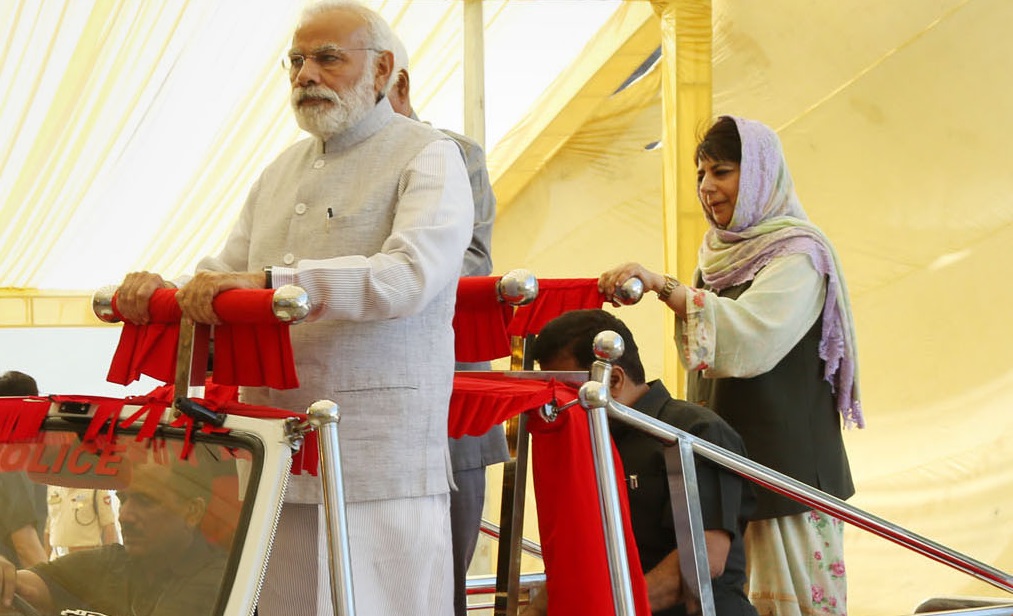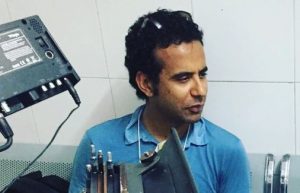
UCLA alumnus and Kashmiri film director Danish Renzu writes that last few days in Kashmir have brought back the days of the ’90s.
By Danish Renzu
Kashmir is not just land. It’s a land of beautiful people, people who have lived through years and years of conflict and have rights to express themselves, have rights to know what are the options they’ve to curtail violence, and have freedom of speech and press to express their plight. One can’t ignore that. One can’t just shut them up, put them behind bars, not allow the voice to surface out. The true story of Kashmir and its people must be heard. Kashmiri voice cannot be suppressed and snatched away by force. It’s inhumane, unjust, unnatural and catastrophic at the same time. Yet it happened. And we can’t allow it any longer.
I left everything in the United States to come back to Kashmir to tell stories from Kashmir. I realized there was a lot not yet been depicted on the big screen. The culture, the music, the tradition, the language, and of course the pain of Kashmiri people who have been living through conflict for over seven decades. I had a dream to revive cinema back in the valley — stories of Kashmir must be heard.
RELATED: US silence on Article 370 repeal is telling: Michael Kugelman (August 7, 2019)
There were so many untold narratives. In every gully. In every Kocha. In every mohalla. A story of a commoner who has been indirectly or directly affected by the conflict in Kashmir, and they have been forbidden to come out and tell their story. They have lived through years and years of a suppressed life where it could take a second for them to cry and grieve for what they’ve lost in this unending conflict.

I realized cinema is the strongest medium to bring these stories to worldwide audiences. Stories of local Kashmiri people. Their day to day life. Their hopes. Their dreams. A dream to see a conflict free Kashmir. I realized people have been numb all these years unable to comprehend what’s going to befall them in the future. The uncertainty — unending curfews, hartals, demonstrations, and killings — people have lived in fear. They just want to be able to have a meal with their family and just live another day. Their dreamy eyes yet spoke of million emotions. The heart wants more. Their story must be heard.
As I explored more, I came up with my first feature Half Widow set in Kashmir with entire cast played by Kashmiri actors. Doordarshan still owed them dues from the last 6 years, so they were craving for work and recognition as artists. When I auditioned them, I was surprised by the emotions they carried and how they understood the nuances of tragedy and pain. It brought tons of emotions and I found a universal connect. We’re all connected by pure human emotion of pain and sorrow. All Kashmiris had it in them, and I realized this film could bring this out. They would be able to express this through dialogues and no dialogues, through emotional scenes we crafted, wearing their own clothes, acting in the real locations.
I was able to capture plethora of real emotions while we shot the film with actors and non-actors. The story depicted the plight of a local Kashmiri woman who had lost her dear one in the conflict and was living a life of a limbo hoping he’ll return one day, hoping for that day when she would hold his hands and go for a walk again. Perhaps he’s alive. But years pass by, and there is no sign of her beloved. She lives in limbo and the only way she was able to express her plight is through writing. Through speech. Through finding her voice. She is free again. She is able to forget the Tragedy and Pain and become complete again.
Such was the narrative and such is the story of every Kashmiri. People who’ve lost so much in this conflict. Their loved ones. Their homes. Their identity. Their opportunity to grow and learn. Their opportunity to become a strong voice. I just realized they’re actually artists. Artists looking for a platform to express their plight. Their values. What they’ve gained. What they’ve lost. They’re artists. Born artists.
The last few days brought back the days of the ’90s. Kashmir is disconnected from the rest world and nothing can go or come out of the valley at the moment. Troops are everywhere. Roads are closed. Voice is snatched away from the people and they’re not allowed to share their plight. Their birth rights are snatched away. They are and should be able to speak up and express their plight, their frustrations, their will. It’s their basic freedom of speech that no can snatch away from them.
People who’ve suffered so long shouldn’t suffer anymore. They’re artists and they will suffocate if not allowed to express. To breathe. To be who they’re. Who they’re meant to be. One can’t stop them. One can’t ban them. They’ll suffer more. They’ll be in more pain. Instead of taking that away from them, it’s been yet again given to them They can’t be caged in a prison. They are meant to be free. To let go and fly and soar high in the sky. One can’t imprison a voice. It’ll find a way and reach out. It’ll find a way and become a revolution. An artist in one can never die, and they eventually do find a way to perform. A story deep in their hearts can’t be untold. Their stories will be told.
The rise of artists from Kashmir in film, music and visual media industry is a revolution of its own. Artists from Kashmir have finally found a platform to vent out their pain — be in through pictures, poetry, films or music. Every cafe you’ll find Kashmiri young youth holding a guitar, a mic or even a camera. The rise of social media has only made it easier for them to share their talent with the world and express their stories. The rise of artists in Kashmir has given rise to a new revolution. We hope that stories from Kashmir reach out to the world, so they understand what really Kashmir is about. How long are they going to be banned? The true story will definitely come out and it’s the core responsibility of filmmaker’s like us that we never fail the narrative of Kashmir. It must speak the truth yet to empower and free the artist in us all.
(A native of Kashmir and alumnus of UCLA, film director Danish Renzu hopes to inspire a new generation of Kashmiri filmmakers to practice their art as a force for unity in the conflicted region. He has directed several short films including award-winning “In Search of America, Inshallah” (2014). His first film Half Widow (2017) showcases the plight of a Kashmiri half widow and received rave reviews worldwide premiering at Seattle International Film Festival. The Illegal (2019) stars Academy winning Life of Pi star Suraj Sharma in the lead explores a journey of an immigrant in Los Angeles and his journey towards the American dream. His next film Pashmina, set for release next year and telling the tales of several Kashmiri lives upended by decades of strife. The film comprises of a stellar cast and crew. He is also working on a musical Songs of Paradise set in Kashmir reviving music and art in Kashmir. He opened his own home production in Kashmir with a goal of reviving cinema back in the valley encouraging youth and local talent to pursue their dreams, also bring the lost culture, music, and traditions of Kashmir to a worldwide audience. He recently created a music video for Zee Music titled, “Yumbarzaloo” spring flower) starring Anisa Butt and Soni Razdan set in Kashmir which created a wave in the Kashmir valley.)



